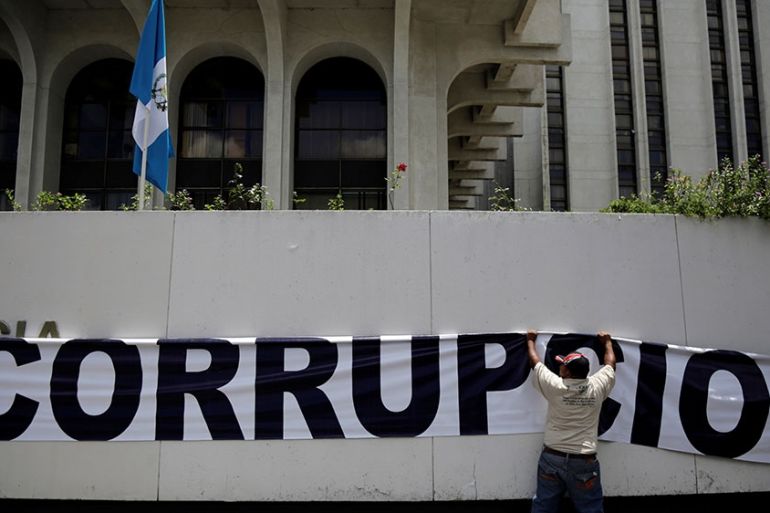Anti-corruption alarm: Efforts are stagnating, warns watchdog
Anti-corruption watchdog Transparency International says political financing is susceptible to corporate interests.

Efforts to combat corruption in more than two thirds of countries around the world are stagnating or backsliding, according to global anti-corruption watchdog Transparency International, as elections and political financing become vulnerable to the influence of vested interests.
Advanced economies such as Canada and Australia have seen a worsening of their perceived levels of corruption, according to Transparency International, a watchdog, which has just released its latest Corruption Perceptions Index for 2019.
Keep reading
list of 4 items‘Absolute power’: After pro-China Maldives leader’s big win, what’s next?
Solomon Islands pro-China PM Manasseh Sogavare fails to secure majority
Pro-China party on course for landslide victory in Maldives election
The scores are calculated annually based on expert assessments and surveys of business executives.
“Even in democracies, such as Australia and India, unfair and opaque political financing and undue influence in decision-making and lobbying by powerful corporate interest groups result in stagnation or decline in control of corruption,” the organisation said in its report.
Globally, people are experiencing frustration with government corruption and a lack of trust in institutions, speaking to a need for greater political integrity, said Delia Ferreira Rubio, chair of Transparency International.
“Governments must urgently address the corrupting role of big money in political party financing and the undue influence it exerts on our political systems,” Rubio said in a statement on Thursday.
“A vast majority of countries that significantly decreased their CPI scores since 2012 do not engage the most relevant political, social and business actors in political decision-making,” the report said.
“To have any chance of ending corruption and improving peoples’ lives, we must tackle the relationship between politics and big money. All citizens must be represented in decision-making,” said Patricia Moreira, managing director of Transparency International.
Countries with broader and more open consultation processes between governments and people scored an average of 61, almost double the score of countries where there is little to no consultation.
Countries that showed improvements included Greece (12), Guyana (12) and Estonia (10), while Canada declined by seven points and Australia by eight points.

But top-scoring countries like Denmark, Switzerland and Iceland are not immune to corruption. While the CPI shows their public sectors to be among the cleanest in the world, corruption still exists, particularly in cases of money laundering and other private sector corruption.
“Integrity at home does not always translate into integrity abroad,” the report said.
“Despite some high-profile fines and prosecutions, our research shows that enforcement of foreign bribery laws among OECD countries is shockingly low.”
Large companies which play outsized roles in national economies are often given significant political support, leading to a failure to hold these corporate entities responsible, Transparency International said.
“Some banks and businesses aren’t just too big to fail – they’re also too powerful to pay. Anti-money laundering supervision and sanctions for breaches are often disjointed and ineffective,” it said.
The anti-corruption watchdog recommends that governments promote the separation of powers, tackle preferential treatment, and control political financing to prevent excessive money and influence in politics.
Governments should also manage conflicts of interest and regulate lobbying activities while strengthening electoral integrity and protecting activists, whistleblowers and journalists, Transparency International said.